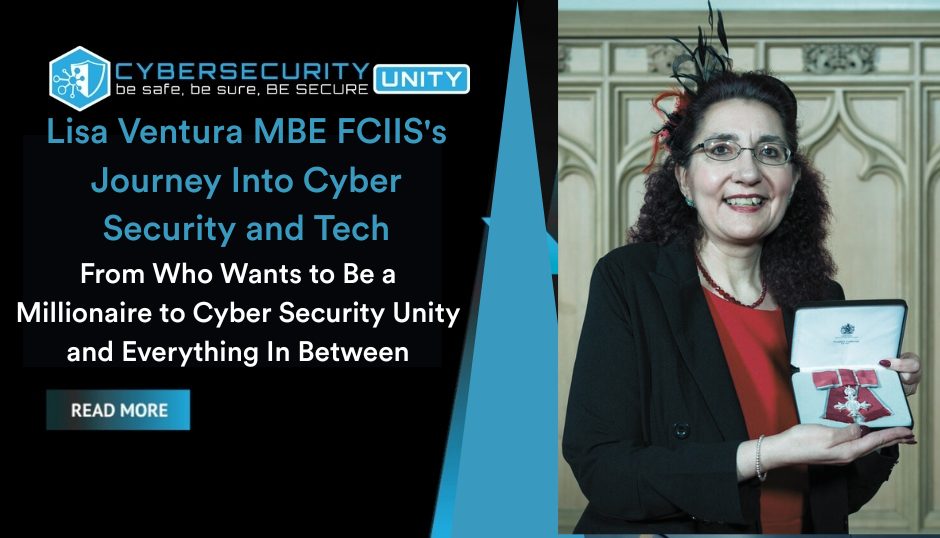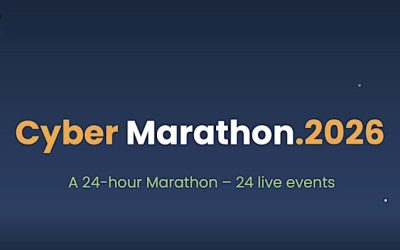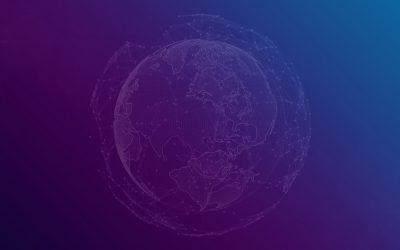By Lisa Ventura MBE FCIIS
Hi! I’m Lisa Ventura MBE FCIIS, also known as “Cyber Geek Girl,” and the Founder of Cyber Security Unity.
Today, I want to share my story with you for Women in Tech Week. My journey into cyber security and tech wasn’t what you’d call traditional, in fact, it was anything but! But that’s exactly why I’m passionate about encouraging more women into this incredible industry. You don’t need to follow a conventional path to make a real impact in tech.
How I First Got Into Cyber Security and Tech
If you’d told me back in the 1990s that I’d be an award-winning cyber security specialist and founder of a global cyber security membership body and trade association by the year 2025, I would have laughed! I spent seven fantastic years working in the entertainment industry with Chris Tarrant, the presenter of “Who Wants to Be a Millionaire.” I got to see that show go from a format on paper called “Cash Mountain” to the world’s most successful TV game show. It was an exhilarating time, and I loved every minute of it.
But technology and gadgets had always fascinated me. I was the only girl in my class at school who had one of the very first home computers, a Texas Instruments TI/499 home computer, and I pestered my parents for AGES to get me one! I’ve always been drawn to things that others might consider “non-typical female interests,” and looking back, I now know that’s partly because I’m #OpenlyNeurodivergent. I was diagnosed as #ActuallyAutistic in 2018, and later with ADHD, dyspraxia, and dyscalculia in 2023. Understanding my neurodivergence helped me realise why I’ve always seen the world differently, why I always struggled to fit in, and why I was drawn to the fascinating world of cyber security.
My transition into cyber security happened in 2009, and I have one person to thank for that opportunity, my ex-wife, Amy Whiting. Amy founded Titania Ltd, a cyber security software development company, and she was an incredible penetration tester and ethical hacker. Through Amy, I was already exposed to the world of cyber security, and I developed a huge interest and fascination in cyberpsychology, the human element of cyber security, and social engineering. These areas stood me in great stead when I transitioned into the industry and joined Titania Ltd.
Amy’s support was instrumental in helping me see that I could make a real contribution to cyber security, even without a traditional technical background. She showed me that the industry needs people who understand human behaviour, communication, and how to make complex technical concepts accessible to everyone. That’s where my entertainment industry experience became invaluable, I could translate all the technical jargon and acronyms into language that everyone could understand.
I was also one of the first members of the Malvern Cyber Security Cluster, which I believe was the first cluster to be launched in the UK (now called Midlands Cyber today). I took part in the Corporate Executive Programme (CEP) in 2010, which was where I first met Dr. Claudia Natanson MBE, who was the Interim CEO of the UK Cyber Security Council and is now the Chair of Trustees there.
The Biggest Challenge I’ve Overcome
Oh gosh, where do I even start with this one? I’ve had to overcome more challenges than I care to remember, but they’ve all shaped who I am today. I’m a survivor, not a victim, and that’s an important distinction to me.
The biggest challenge came in 2012-2013. My first marriage ended suddenly in February 2012 when my ex-wife Amy announced she no longer loved me as a wife anymore. It hit me like a ton of bricks. Not only did I have to start again on a personal level, but also with my career, as the cyber security company I’d joined that got me into the industry was her company. It was heartbreaking and devastating in equal measure.
But I dusted myself off and moved forward. I remarried in 2013 and became pregnant, which after 6 early miscarriages with Amy, was everything I’d ever dreamed of. However, when I was 33 weeks along, my son Francesco “Frankie” Enrico Ventura was stillborn on November 29, 2013. We already knew he would have disabilities from scans we had before he was born, but we discovered that had he been born alive, he would have been those disabilities would have been catastrophic for him due to a rare genetic abnormality as he had two identical copies of chromosome 15. It was the lowest point in my entire life.
I had prepared to be a full-time mother to a son with significant disabilities, and suddenly those plans were gone. I had to start my career from scratch yet again. I went through multiple close family bereavements after that – my father-in-law, two close cousins, my beloved Aunty Maria, my beloved Uncle Vincenzo, and another close cousin who was just 42.
I went through all of this while still trying to forge a career in cyber security.
What did I learn from it all? I learned that I am stronger than I ever thought possible. I learned that tomorrow is not guaranteed, so I only live for the 24 hours in front of me. I learned that it’s okay to not be okay, and that asking for help is a sign of strength, not weakness. Most importantly, I learned that as Maya Angelou famously said: “My mission in life is not merely to survive, but to thrive; and to do so with some passion, some compassion, some humour and some style.” Those words have become my mantra.
I also learned that diversity in tech isn’t just about ticking boxes, it’s about bringing different perspectives, experiences, and ways of thinking to solve problems. My neurodivergence, my lived experiences, my “non-linear” journey into tech, all of these things make me better at what I do because I see things differently.
The Mentors, Sponsors, and Allies Who Helped Me Along the Way
I’ve been incredibly fortunate to have some amazing people support me throughout my journey. A couple of them include:
Amy Whiting, my ex-wife, was my first real ally in the cyber security world. She gave me my start in the industry and showed me that there was a place for someone like me – someone who understood people and communication as much as technology. Even though our marriage didn’t work out, I’ll always be grateful for the opportunity she gave me and for believing in me.
Dr. Claudia Natanson MBE has been a fantastic mentor and supporter. Meeting her through the Corporate Executive Programme in 2010 was pivotal, and working with her at the UK Cyber Security Council in 2021/2022 was an incredible experience.
I’ve also been supported by the cyber security community at large. The clusters, the networking events, the countless people who believed in what I was trying to build with Cyber Security Unity (formerly the UK Cyber Security Association) and now the AI and Cyber Security Association, they all played a role in my success.
But here’s something important: I didn’t always have mentors or sponsors. Sometimes, you have to be brave enough to create your own opportunities. That’s what I did when I founded the UK Cyber Security Association in 2015 because I spotted a gap for a trade association dedicated solely to cyber security. I saw what was missing and decided to build it myself.
My Advice to Women Starting Out in Tech
Right, let me be really honest with you here:
- You don’t need a traditional technical background to make it in tech or cyber security. I came from the entertainment industry! What matters is your curiosity, your ability to learn, and your passion for what you do. The human element of cyber security is just as important as the technical side, and we desperately need people who can bridge that gap.
- Your “different” background is your superpower, not your weakness. Whether you’re neurodivergent like me, coming from a non-traditional background, or just see the world differently, that’s what makes you valuable. Don’t try to hide what makes you unique; embrace it!
- The ability to continuously learn and adapt is more important than mastering any single tool or technology. Cyber security and tech is constantly evolving. Stay curious, keep honing your critical thinking skills, and be proactive about expanding your knowledge. This adaptability will not only make you more resilient in a fast-paced environment, but it will also keep your career exciting and future-proof.
- Don’t wait for permission or for someone to hand you opportunities. If you see a gap, fill it. If you have an idea, pursue it. I founded Cyber Security Unity (formerly the UK Cyber Security Association) and today the AI and Cyber Security Association because I saw a need for it, not because someone told me to do it.
- Build your network and your community. Some of the most valuable relationships in my career came from attending cyber security clusters, conferences, and networking events. Put yourself out there, even when it’s uncomfortable (especially when it’s uncomfortable!).
- It’s okay to ask for help, and it’s okay to not be okay. Mental health is something I’m passionate about raising awareness of in the cyber security industry. This is a demanding field, and managing stress and burnout is crucial. Don’t suffer in silence.
- Never, ever let the bullies and abusers win. I’ve experienced significant bullying in this industry and throughout my lifetime, and I regret the times I walked away instead of standing up for myself. Stand your ground, know your worth, and don’t let anyone diminish your achievements.
- Find your tribe. Whether that’s a women in tech network, a neurodiversity group, or just a community of people who “get” you, having your people makes all the difference.
How I Balance Work, Learning, and Life
I’ll be honest, “balance” is something I’m constantly working on! There’s no perfect formula, but here’s what works for me:
I work from home, which gives me flexibility but also means I need to be disciplined about boundaries. My beautiful German Shepherd/Husky cross dog, Poppy, helps with that, she reminds me when it’s time for walks and breaks! 🐕
I only plan 24 hours ahead. After everything I’ve been through, I’ve learned that tomorrow isn’t guaranteed. I make the most of each day, I savour it, and I make memories. This might sound counterintuitive, but it’s actually helped me be more productive because I focus on what matters most in the moment.
I prioritise my mental and physical health. I qualified as a Reiki healing practitioner in 2019, and practices like that help me manage stress. I also love heavy metal and rock music (Black Sabbath and Queen are my all-time favourite bands), cranking up some good music is therapeutic for me!
I embrace my neurodivergence rather than fighting it. Understanding that I’m autistic and have ADHD has helped me work with my brain, not against it. I know when I’m most productive, I know what environments I need to thrive, and I’m not afraid to ask for and advocate for what I need.
I’m selective about what I say yes to. There are countless opportunities in this industry, conferences, speaking engagements, projects, but I’ve learned to be strategic about what I commit to. Quality over quantity every time.
I make time for the things I love. Whether that’s reading autobiographies (I’m currently reading the new Ozzy Osbourne autobiography “Last Rites”), watching sci-fi, learning about nuclear war history (I’m fascinated by the Cold War!), or spending time with my Poppy, I protect time for my interests and passions.
What Excites Me Most About the Future of Cyber Security and Tech
Honestly? So many things:
The integration of AI in cyber security is both thrilling and challenging. We’re at a pivotal moment where AI can be used to both attack and defend systems. The professionals who will succeed in this new era are those who understand not just how to use AI tools, but how AI models can be exploited, how to think like attackers, and how to build ethical and transparent AI systems. This is where the human element becomes even more critical, and why I have founded the AI and Cyber Security Association to raise awareness of and promote and champion the safe, secure, responsible and ethical use of AI.
The growing recognition of neurodiversity as a strength in cyber security excites me immensely. Neurodivergent people often have unique pattern-recognition abilities, attention to detail, and creative problem-solving skills that are incredibly valuable in cyber security. I love seeing more organisations recognise this and actively work to recruit and support neurodivergent talent.
The focus on the human element and cyber security culture is finally getting the attention it deserves. For years, I’ve been banging on about how cyber security isn’t just a technology problem – it’s a people problem. Seeing organisations prioritise cyber security awareness, culture change, and understanding human behaviour in security contexts makes me incredibly hopeful.
The push for greater diversity and inclusion in the industry is gaining momentum. Yes, we still have a long way to go (the percentage of women in cyber security roles has actually decreased since 2009, which is deeply disappointing), but I see more genuine commitment to change. We need more diversity, fewer artificial barriers, and more genuinely entry-level jobs in cyber security.
The collaborative spirit that’s emerging in the industry is wonderful to witness. Through the communities I have founded and nurtured, and initiatives like #InfosecLunchHour (my monthly virtual networking meet-up on Zoom), I see people coming together to share knowledge, support each other, and tackle the growing cyber threat as a community rather than in silos.
The recognition that cyber security is a board-level concern, not just an IT issue, is transforming how organisations approach security. This elevates the importance of what we do and creates more opportunities for cyber security professionals to have strategic influence.
Final Thoughts
Receiving an MBE from King Charles III in his 2023 Birthday Honours List for services to cyber security and to diversity, equity, belonging and inclusion was one of the proudest moments of my life. Being recognised in the “Cyber Security Citizen of the Year” category at the National Cyber Awards was another career highlight in 2024, as was being made a Fellow of the Chartered Institute of Information Security in May 2025. And of course winning a TechWomen 100 award in 2019.
But you know what means even more to me? The messages I receive from countless women who say my story inspired them to enter or stay in the cyber security industry. The neurodivergent professionals who tell me that seeing someone like them succeed gave them confidence. The people who found hope in my story of resilience.
That’s what Women in Tech Week is all about, sharing our stories, lifting each other up, and showing the next generation that there’s a place for them in this incredible industry, no matter what their background or journey looks like.
If there’s one thing I want you to take away from my story, it’s this: Your journey doesn’t have to be linear, traditional, or “perfect” for you to succeed in tech. Your challenges can become your strengths. Your differences can become your superpowers. And your story – whatever it is – matters.
Not only can you survive in this industry, but as the great Maya Angelou said you can thrive in with passion, compassion, humour, and style. And that is exactly what I have chosen to do.
Finally, thank you so much We Are Tech Women for believing in me, for championing me and for supporting everything I do, and of course for my TechWomen 100 Award in 2019. I can’t recommend them enough 😊





